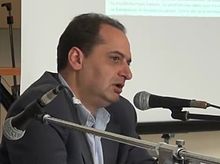Christos Spirtzis
| Christos Spirtzis | |
|---|---|
| Χρήστος Σπίρτζης | |
 |
|
| Alternate Minister of Infrastructure, Transport and Networks | |
|
In office 28 January 2015 – 28 August 2015 |
|
| Prime Minister | Alexis Tsipras |
| Personal details | |
| Born | 1969 (age 47–48) Athens, Greece |
| Political party | Independent |
| Spouse(s) | Dimitra Foufri |
| Children | 2 (Panagiotis, Kallia) |
| Alma mater | Democritus University of Thrace |
| Profession | Electrical engineer |
Christos Spirtzis (Greek: Χρήστος Σπίρτζης; born 1969 in Athens) is a Greek engineer and center-leftindependent politician. Since 28 January 2015 he has been the Alternate Minister of Infrastructure, Transport and Networks in the government of Alexis Tsipras.
Born 1969 in Athens and raised in the nearby Ampelokipoi, Spirtzis studied Electrical engineering at the Democritus University of Thrace.
In 1999 he was appointed a member of the Economic and Social Committee of Greece, a post he would hold until 2008. One year later, in 2000, Spirtzis was elected to the executive committee of the Technical Chamber of Greece (TEE). In 2007, he became vice president responsible for energy, development, employment, insurance, licensing, publications, ethics in representation, and the databank. In September 2010, he was promoted to the post of the president of the chamber. Presiding over the Democratic Coalition of Technicians (Δημοκρατικής Συμπαράταξης Μηχανικών), he was re-elected as president of TEE in 2013. He also chairs the Hellenic National Committee at the World Energy Council.
Spirtzis, who has been described as a "child" of social-democratic PASOK, however wasn't hesitant to clash with his party, especially in strongly opposing the Memorandum. After the January 2015 legislative election, Spirtzis was appointed Alternate Minister of Infrastructure, Transport and Networks by the Syriza-led government of Alexis Tsipras. He was sworn in on 28 January 2015, one day later than most ministers, as the Council of State had to approve the merging of ministries first. Announcing that the government would stop the privatization of fourteen regional airports, he said: "The central position of the government is to stop the privatizations of infrastructure which serve and can help the development of the country."
...
Wikipedia
